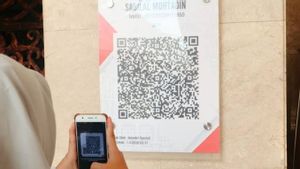JAKARTA - The United States (US) has again highlighted the policy of Indonesia's digital payment system, especially QRIS (Quick Response Code Indonesian Standard) and GPN (National Payment Gateway), through the 2025 National Trade Estate (NET) report.
Jakarta Veterans UPN Public Policy Economist and Expert Achmad Nur Hidayat said QRIS had become the backbone of digital transactions in Indonesia, with more than millions of merchants and hundreds of millions of active users by 2025.
"QRIS is not just a QR code-based payment technology. It is a digital public infrastructure that brings together various electronic payment methods to be compatible nationally," he said in his statement, Tuesday, April 22.
Achmad said that the purpose of Bank Indonesia (BI) to apply this standard is to simplify the payment system, reduce transaction costs, and expand the reach of formal financial services to all corners of the country.
He added that in the context of developing countries such as Indonesia, where financial inclusion is a major challenge, QRIS has become one of the important catalysts in encouraging an inclusive digital economy.
Meanwhile, this success cannot be separated from Bank Indonesia's policy, which since 2019 ensures that all QR code transactions follow national standards so that they can unify the fragmentation of digital payment systems, reduce transaction costs, and expand financial access for MSMEs and rural communities.
However, the US sees this policy as a form of protectionism that hinders integration with the global system.
Achmad explained that for Indonesia, QRIS is not just a transaction tool, but a strategic instrument to protect the financial data of its citizens so that cybercrime threats are not widespread and potential data abuse by foreign corporations, full control of payment infrastructure is a rational defensive step.
"Imagine if the QRIS system is operated by foreign companies: transaction data of hundreds of millions of Indonesians can be recorded on foreign servers, vulnerable to surveillance of foreign governments or leaks that harm consumers," he said.
In addition, the US has also criticized restrictions on foreign ownership in the payment sector, such as the 20 percent limit of ownership for backend infrastructure companies.
Meanwhile, this policy is considered to hinder foreign investment and Indonesia is not the only country that imposes similar regulations. India, for example, limits foreign ownership in fintech companies by up to 49 percent to protect the domestic market.
Meanwhile, China has even closed its digital payment system meeting with the Great Firewall policy and this restriction is not without reason because the financial sector is the lifeblood of a country's economy.
Achmad said that the financial sector is controlled by foreigners, not only vulnerable data, but monetary stability and fiscal policy can be influenced by outside interests.
"The 1998 Asian financial crisis is proof of how out of control the liberalization of the financial sector could lead to economic collapse," he stressed.
According to him, by limiting foreign ownership, Indonesia is trying to ensure that strategic decisions in the payment sector remain in local hands, so that responses to crises can be faster and more measurable.
Meanwhile, apart from geopolitical issues and sovereignty, Achmad said that the construction of domestic payment systems is also very rational in terms of cost efficiency because before GPN and QRIS, transactions using international networks are often subject to high costs because they have to go through foreign switching.
"This is not only burdensome for consumers, but also for micro, small and medium enterprises (MSMEs) which are now the backbone of the economy," he said.
Achmad said that with QRIS, transaction costs could be reduced, so that more informal business actors could join the digital financial ecosystem.
He added that this also had a positive impact on the government in terms of expanding the tax base and digital distribution of social assistance. And this efficiency is not only a matter of commercial gain, but concerns social justice and national economic sustainability.
SEE ALSO:
Achmad conveyed that US criticism of the GPN which requires debit/credit card transactions to be processed through a local gateway also needs to be seen from a historical perspective.
Prior to the GPN, about 90 percent of card transactions in Indonesia were controlled by international networks such as Visa and Mastercard, with high switching costs With the presence of GPN can reduce these costs while reducing dependence on the outside system.
"This step is in line with global trends. Russia, for example, developed the Mir Card system after Western sanctions cut its access to SWIFT. However, the US considers GPN and QRIS to be "incompatible" with the global system," he said.
Achmad said here there is a paradox where on the one hand, US companies want integration, but on the other hand, they are reluctant to adjust to local standards.
"In fact, the compatibility should be two-way in nature. Instead of forcing Indonesia to adopt global standards, foreign companies can innovate so that its services are in line with QRIS. In fact, the inability to adapt to local policies is at the root of the problem," he said.
The English, Chinese, Japanese, Arabic, and French versions are automatically generated by the AI. So there may still be inaccuracies in translating, please always see Indonesian as our main language. (system supported by DigitalSiber.id)
















